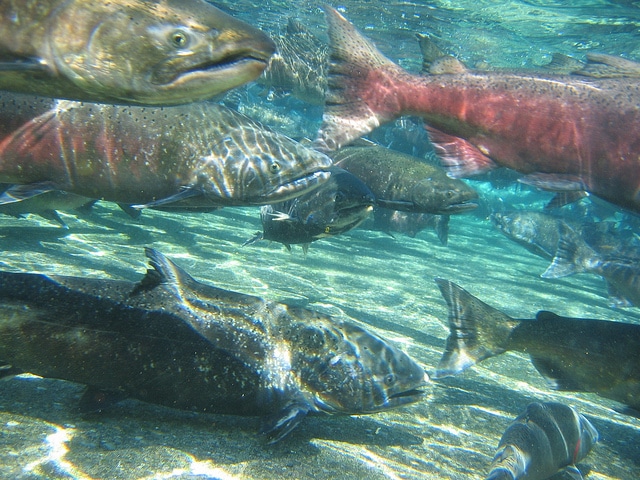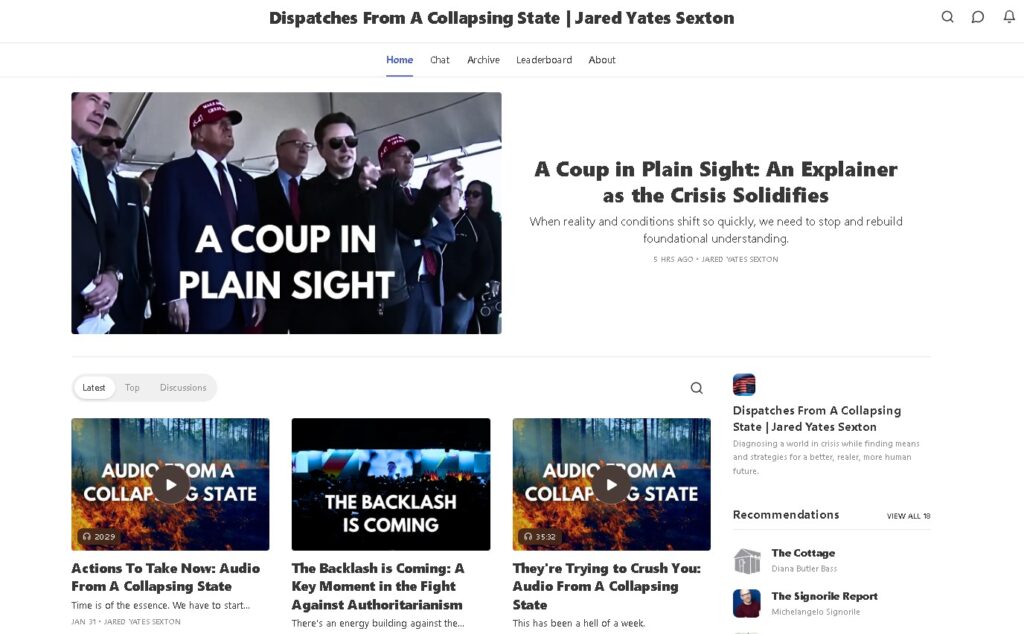Ecojustice lawyers were among the many to file motions to the National Energy Board late last week regarding Kinder Morgan’s poor and non-existent responses to questions posed to it by intervenors. And while we were generally disappointed by Kinder Morgan’s evasive approach, we were shocked at one reply in particular.
When asked whether there is any evidence from cold water oil spills to suggest marine fish are impacted, Kinder Morgan’s response was that: “Harm to marine fish populations seems to be the exception, rather than the rule, following marine oil spills.”
That’s right – Kinder Morgan’s view is that when oil is spilled in water, there is little harm to fish, and it is more likely the fish will be just fine.
The motion Ecojustice lawyers filed on behalf of our clients, Living Oceans Society and Raincoast Conservation Foundation, asks the Board to order Kinder Morgan to fully respond to our clients’ first round of information requests about the Trans Mountain Expansion Project.
Kinder Morgan received more than 10,000 questions from intervenors. As we wrote last month, the company asked for an extension of the time limit to respond, but got only 14 of the 23 days they asked for. Our clients supported the request, in the interest of allowing Kinder Morgan time to provide as much information as possible.
Kinder Morgan’s slippery responses
But now that the responses are in, we wonder whether the extra nine days would have made a difference. Responses from the company have ranged from vague to incomplete to non-existent. In short The information provided by Kinder Morgan is not nearly good enough. Of the 253 responses our clients received from the company, at least 77 – approximately 30 per cent – were inadequate.
In 20 responses, Kinder Morgan refused to answer the question in whole or in part, by:
- Claiming it was “not relevant” to the review (including the record of leaks and ruptures on Kinder Morgan’s other pipeline systems, and the make and model of clean-up equipment); or
- Stating that it did not have the information (including air monitoring information), because the data do not exist, because the answer was not in the documents they relied on in the application, or because they had not done the necessary work to answer.
In five responses, Kinder Morgan gave a response which only partially answered the question or provided an answer but not the supporting data requested.
In the remainder of the responses, Kinder Morgan simply didn’t answer the questions it was asked. Here’s a snapshot of the ways the company answered questions with non-answers:
- Cited a large document or report rather than provide an clear answer;
- Referred to a document that did not contain any answer to the question;
- Said it would file an answer later; or
- Cited a legal standard rather than address facts.
As we mentioned above, when our clients asked if there was evidence from cold water oil spills, beyond evidence from the Exxon Valdez oil spill, of marine fish communities or habitat being impacted for more than two years after a spill, this was Kinder Morgan’s response: “Harm to marine fish populations seems to be the exception, rather than the rule, following marine oil spills.”
In support of that mystifying non-answer, Kinder Morgan cited a 264-page report from Enbridge’s reply evidence in the Northern Gateway pipeline hearings.
We’ve written about how, in the wake of the 2012 omnibus budget bill, reviews of major pipeline projects have been scaled back dramatically, sacrificing good science and process for “efficiency.” The Kinder Morgan Trans Mountain Expansion Project hearing, with its 15-month time limit and lack of oral cross-examination, is a prime example of how this shift is deeply problematic.
We are now halfway through the two rounds of intervenor information requests, which are intervenors’ only chance to ask Kinder Morgan questions about its 15,000-page application. Our clients are increasingly worried that they will be unable to meaningfully challenge Kinder Morgan’s evidence, particularly given its evasive approach to our information requests.
But as for the fish, according to Kinder Morgan, they will be just fine.
– See more at: http://www.ecojustice.ca/blog/the-fish-are-fine-kinder-morgan-says#sthas…
Ecojustice lawyers were among the many to file motions to the National Energy Board late last week regarding Kinder Morgan’s poor and non-existent responses to questions posed to it by intervenors. And while we were generally disappointed by Kinder Morgan’s evasive approach, we were shocked at one reply in particular.
When asked whether there is any evidence from cold water oil spills to suggest marine fish are impacted, Kinder Morgan’s response was that: “Harm to marine fish populations seems to be the exception, rather than the rule, following marine oil spills.”
That’s right – Kinder Morgan’s view is that when oil is spilled in water, there is little harm to fish, and it is more likely the fish will be just fine.
The motion Ecojustice lawyers filed on behalf of our clients, Living Oceans Society and Raincoast Conservation Foundation, asks the Board to order Kinder Morgan to fully respond to our clients’ first round of information requests about the Trans Mountain Expansion Project.
Kinder Morgan received more than 10,000 questions from intervenors. As we wrote last month, the company asked for an extension of the time limit to respond, but got only 14 of the 23 days they asked for. Our clients supported the request, in the interest of allowing Kinder Morgan time to provide as much information as possible.
Kinder Morgan’s slippery responses
But now that the responses are in, we wonder whether the extra nine days would have made a difference. Responses from the company have ranged from vague to incomplete to non-existent. In short The information provided by Kinder Morgan is not nearly good enough. Of the 253 responses our clients received from the company, at least 77 – approximately 30 per cent – were inadequate.
In 20 responses, Kinder Morgan refused to answer the question in whole or in part, by:
- Claiming it was “not relevant” to the review (including the record of leaks and ruptures on Kinder Morgan’s other pipeline systems, and the make and model of clean-up equipment); or
- Stating that it did not have the information (including air monitoring information), because the data do not exist, because the answer was not in the documents they relied on in the application, or because they had not done the necessary work to answer.
In five responses, Kinder Morgan gave a response which only partially answered the question or provided an answer but not the supporting data requested.
In the remainder of the responses, Kinder Morgan simply didn’t answer the questions it was asked. Here’s a snapshot of the ways the company answered questions with non-answers:
- Cited a large document or report rather than provide an clear answer;
- Referred to a document that did not contain any answer to the question;
- Said it would file an answer later; or
- Cited a legal standard rather than address facts.
As we mentioned above, when our clients asked if there was evidence from cold water oil spills, beyond evidence from the Exxon Valdez oil spill, of marine fish communities or habitat being impacted for more than two years after a spill, this was Kinder Morgan’s response: “Harm to marine fish populations seems to be the exception, rather than the rule, following marine oil spills.”
In support of that mystifying non-answer, Kinder Morgan cited a 264-page report from Enbridge’s reply evidence in the Northern Gateway pipeline hearings.
We’ve written about how, in the wake of the 2012 omnibus budget bill, reviews of major pipeline projects have been scaled back dramatically, sacrificing good science and process for “efficiency.” The Kinder Morgan Trans Mountain Expansion Project hearing, with its 15-month time limit and lack of oral cross-examination, is a prime example of how this shift is deeply problematic.
We are now halfway through the two rounds of intervenor information requests, which are intervenors’ only chance to ask Kinder Morgan questions about its 15,000-page application. Our clients are increasingly worried that they will be unable to meaningfully challenge Kinder Morgan’s evidence, particularly given its evasive approach to our information requests.
But as for the fish, according to Kinder Morgan, they will be just fine.
– See more at: http://www.ecojustice.ca/blog/the-fish-are-fine-kinder-morgan-says#sthas…
This is a guest post by Ecojustice staff lawyer Dyna Tuytel.
Ecojustice lawyers were among the many to file motions to the National Energy Board late last week regarding Kinder Morgan’s poor and non-existent responses to questions posed to it by intervenors. And while we were generally disappointed by Kinder Morgan’s evasive approach, we were shocked at one reply in particular.
When asked whether there is any evidence from cold water oil spills to suggest marine fish are impacted, Kinder Morgan’s response was that: “Harm to marine fish populations seems to be the exception, rather than the rule, following marine oil spills.”
That’s right — Kinder Morgan’s view is that when oil is spilled in water, there is little harm to fish, and it is more likely the fish will be just fine.
The motion Ecojustice lawyers filed on behalf of our clients, Living Oceans Society and Raincoast Conservation Foundation, asks the Board to order Kinder Morgan to fully respond to our clients’ first round of information requests about the Trans Mountain Expansion Project.
Kinder Morgan received more than 10,000 questions from intervenors. As we wrote last month, the company asked for an extension of the time limit to respond, but got only 14 of the 23 days they asked for. Our clients supported the request, in the interest of allowing Kinder Morgan time to provide as much information as possible.
Kinder Morgan’s slippery responses
But now that the responses are in, we wonder whether the extra nine days would have made a difference. Responses from the company have ranged from vague to incomplete to non-existent. In short, the information provided by Kinder Morgan is not nearly good enough. Of the 253 responses our clients received from the company, at least 77 — approximately 30 per cent — were inadequate.
In 20 responses, Kinder Morgan refused to answer the question in whole or in part, by:
- Claiming it was “not relevant” to the review (including the record of leaks and ruptures on Kinder Morgan’s other pipeline systems, and the make and model of clean-up equipment); or
- Stating that it did not have the information (including air monitoring information), because the data do not exist, because the answer was not in the documents they relied on in the application, or because they had not done the necessary work to answer.
In five responses, Kinder Morgan gave a response which only partially answered the question or provided an answer but not the supporting data requested.
In the remainder of the responses, Kinder Morgan simply didn’t answer the questions it was asked. Here’s a snapshot of the ways the company answered questions with non-answers:
- Cited a large document or report rather than provide an clear answer;
- Referred to a document that did not contain any answer to the question;
- Said it would file an answer later; or
- Cited a legal standard rather than address facts.
As we mentioned above, when our clients asked if there was evidence from cold water oil spills, beyond evidence from the Exxon Valdez oil spill, of marine fish communities or habitat being impacted for more than two years after a spill, this was Kinder Morgan’s response: “Harm to marine fish populations seems to be the exception, rather than the rule, following marine oil spills.”
In support of that mystifying non-answer, Kinder Morgan cited a 264-page report from Enbridge’s reply evidence in the Northern Gateway pipeline hearings.
We’ve written about how, in the wake of the 2012 omnibus budget bill, reviews of major pipeline projects have been scaled back dramatically, sacrificing good science and process for “efficiency.” The Kinder Morgan Trans Mountain Expansion Project hearing, with its 15-month time limit and lack of oral cross-examination, is a prime example of how this shift is deeply problematic.
We are now halfway through the two rounds of intervenor information requests, which are intervenors’ only chance to ask Kinder Morgan questions about its 15,000-page application. Our clients are increasingly worried that they will be unable to meaningfully challenge Kinder Morgan’s evidence, particularly given its evasive approach to our information requests.
But as for the fish, according to Kinder Morgan, they will be just fine.
Image: Courtesy of Pacific Northwest National Laboratory.
Subscribe to our newsletter
Stay up to date with DeSmog news and alerts







